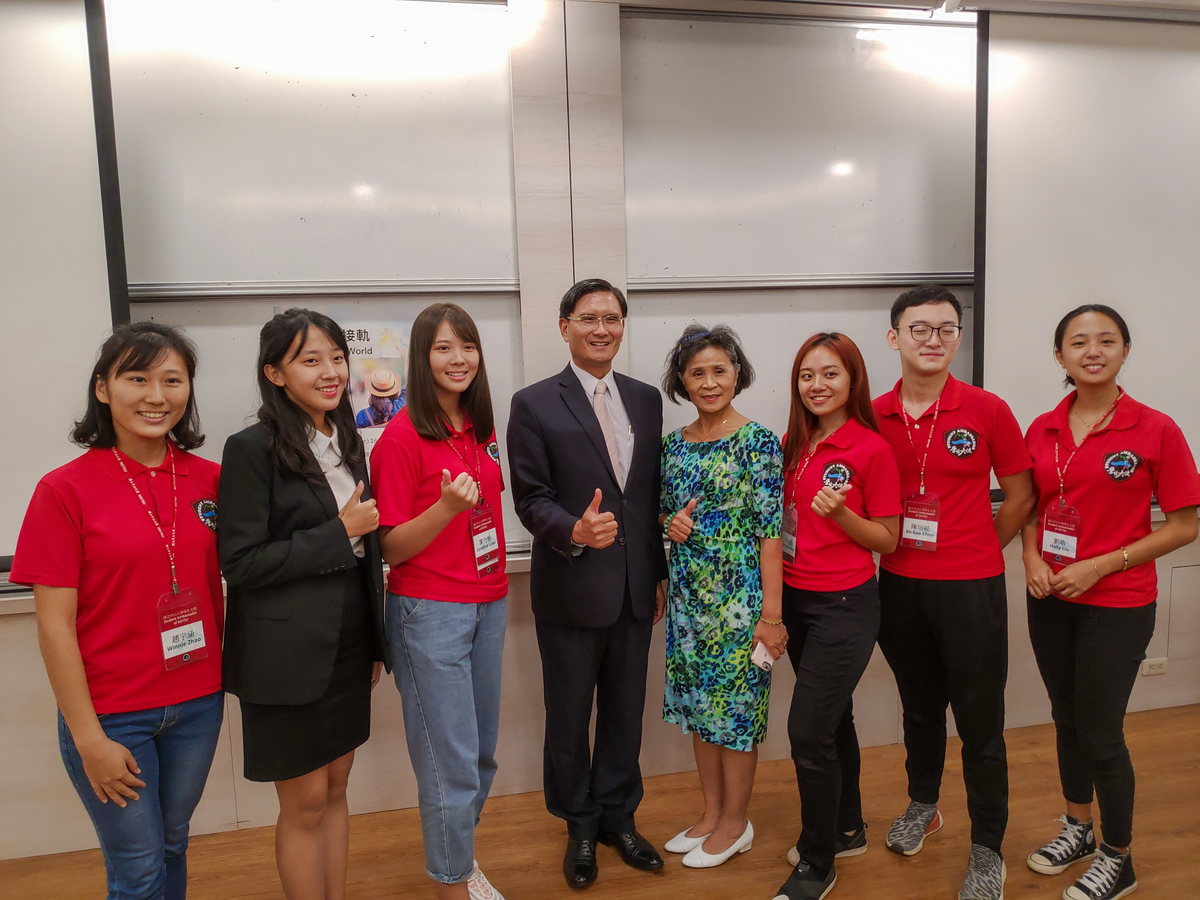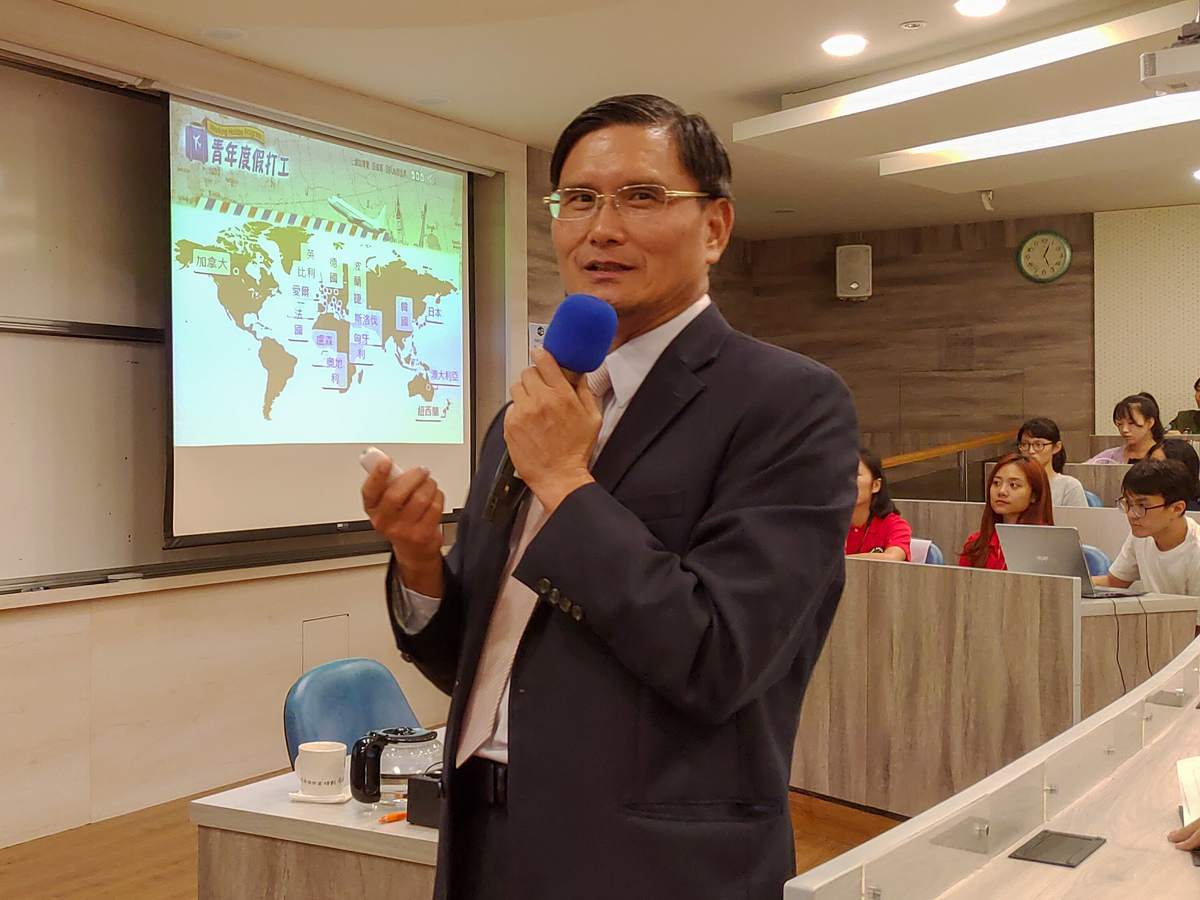Advice for future diplomats: 3 things to grasp and 2 programs to apply for during your studies!


(Interview and report provided by student journalist Pai-Han Tseng)
Director-General William Heng-sheng Chuang of the Southern Taiwan Office, Ministry of Foreign Affairs, was invited to NSYSU to share his view on “How to make a connection with the world.” Chuang used to be a diplomat stationed in England, Boston, Belgium, Vancouver, and Denmark. He believes that the most important thing as a diplomat is not the college major one studies but “three Ps”: personality, passion, and performance. The three Ps apply to any profession, not just diplomacy.
“To push forward an issue, diplomats need to have a specific character and be good at networking,” said Chuang. Working for a foreign mission, one needs to be available 24 hours a day to help compatriots solve their problems on foreign land; being woken up by a phone call in the middle of the night is nothing out of the ordinary for a diplomat. If one is not passionate about this job, he/she will not endure it for long. Professional abilities, such as language skills, law knowledge, and document processing, are crucial as well. With these three abilities, one can succeed in any workplace.
As a journalism graduate, Chuang discovered his keen interest in politics and law. During his studies, he would often attend lectures at National Chengchi University. Later on, Chuang decided to take a diplomacy exam. Chuang said that what one has learned during undergraduate studies is just a base; master and doctoral studies are the dividing lines to the real profession. Chuang encouraged the students interested in diplomacy to try different fields. “Among my colleagues are people with a background in electrical engineering, medicine, and pharmacy,” he said.
How to increase international participation? Chuang recommended two ways to do it. He encouraged the students to catch the opportunity to join the International Youth Ambassadors Exchange Program while they are still studying; the costs of the visit abroad are nearly entirely covered by the government. Working holiday visa available for people aged from 18 to 35 is another option, letting young people legally work in countries that have an agreement on the program without financial pressure. Chuang also reminded students to prepare well for a trip abroad, study the local culture and political situation of the destination to avoid stepping on a landmine.
Chuang considers Taiwan highly competitive on the international level: R.O.C. nationals are eligible for visa-exempt entry to 168 countries, which is a significant acknowledgment for Taiwan. He recalls a previous experience in Taipei Representative Office in Denmark, when a 93-year old Danish doctor, not too long before he passed away, made a call to express his love and support for Taiwan - another example of the positive image of Taiwan abroad.
(Edited by Public Affairs Division)
Director-General William Heng-sheng Chuang of the Southern Taiwan Office, Ministry of Foreign Affairs, was invited to NSYSU to share his view on “How to make a connection with the world.” Chuang used to be a diplomat stationed in England, Boston, Belgium, Vancouver, and Denmark. He believes that the most important thing as a diplomat is not the college major one studies but “three Ps”: personality, passion, and performance. The three Ps apply to any profession, not just diplomacy.
“To push forward an issue, diplomats need to have a specific character and be good at networking,” said Chuang. Working for a foreign mission, one needs to be available 24 hours a day to help compatriots solve their problems on foreign land; being woken up by a phone call in the middle of the night is nothing out of the ordinary for a diplomat. If one is not passionate about this job, he/she will not endure it for long. Professional abilities, such as language skills, law knowledge, and document processing, are crucial as well. With these three abilities, one can succeed in any workplace.
As a journalism graduate, Chuang discovered his keen interest in politics and law. During his studies, he would often attend lectures at National Chengchi University. Later on, Chuang decided to take a diplomacy exam. Chuang said that what one has learned during undergraduate studies is just a base; master and doctoral studies are the dividing lines to the real profession. Chuang encouraged the students interested in diplomacy to try different fields. “Among my colleagues are people with a background in electrical engineering, medicine, and pharmacy,” he said.
How to increase international participation? Chuang recommended two ways to do it. He encouraged the students to catch the opportunity to join the International Youth Ambassadors Exchange Program while they are still studying; the costs of the visit abroad are nearly entirely covered by the government. Working holiday visa available for people aged from 18 to 35 is another option, letting young people legally work in countries that have an agreement on the program without financial pressure. Chuang also reminded students to prepare well for a trip abroad, study the local culture and political situation of the destination to avoid stepping on a landmine.
Chuang considers Taiwan highly competitive on the international level: R.O.C. nationals are eligible for visa-exempt entry to 168 countries, which is a significant acknowledgment for Taiwan. He recalls a previous experience in Taipei Representative Office in Denmark, when a 93-year old Danish doctor, not too long before he passed away, made a call to express his love and support for Taiwan - another example of the positive image of Taiwan abroad.
(Edited by Public Affairs Division)
Click Num:
Share
